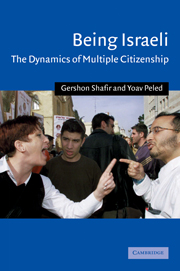1 - Introduction
Published online by Cambridge University Press: 05 June 2012
Summary
For some time now, Israel's main political and moral dilemma has been described as the need to choose between the two cardinal principles of its political culture: the particularistic commitment to being a Jewish state and the universalist commitment to being a Western-style democracy. The former course would seem to indulge the desire for a homogenous nation-statehood by excluding Palestinians from equal citizenship, whereas the latter would gratify the aspiration for democratization by making Israel the state of all of its citizens (see Tel Aviv University Law Review 1995; Mautner et al. 1998; Margolin 1999; Gavison 1999; David 2000). Though such an overly formalistic depiction of these two political principles and their partisans highlights their deep-seated mutual hostility, it masks the tensions within each one of them. Thus, the Jewish element in the Jewish–democratic formula involves a contradiction between Zionism as a secular nationalist movement, seeking self-determination for the Jewish people, and Judaism as both a religious tradition and, in its Orthodox version, a state religion. Nor does the Jewish–democratic distinction recognize the systematic ethnic stratification of Israeli Jews. Similarly, the meaning of democracy is hardly self-evident in the Israeli context. It ranges from an older formalistic arrangement of electoral procedures to a newer substantive liberal conception, focused on a working civil society. Most importantly, the Jewish–democratic dichotomy glosses over the way in which the tension between these two principles has been encompassed by a third – the colonial character of the Zionist state- and nation-building project.
- Type
- Chapter
- Information
- Being IsraeliThe Dynamics of Multiple Citizenship, pp. 1 - 34Publisher: Cambridge University PressPrint publication year: 2002
- 1
- Cited by

